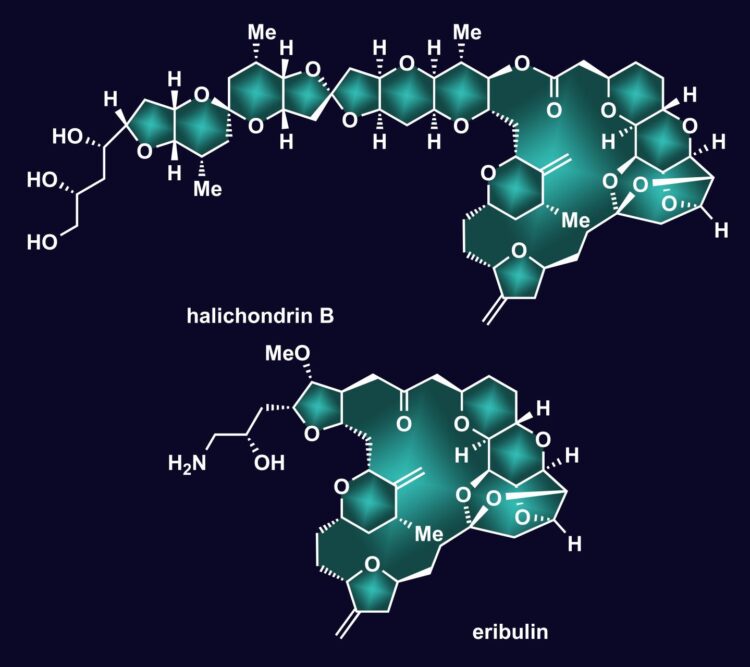Rice’s K.C. Nicolaou lab makes synthesis of halichondrin B more efficient
HOUSTON – (June 29, 2021) – The story of halichondrin B, an inspirational molecule obtained from a marine creature, goes back to the molecule’s discovery in an ocean sponge in 1986.
Though it has been replicated in the laboratory several times before, new work by Rice University chemists could make halichondrin B and its naturally occurring or designed variations easier to synthesize.
Synthetic chemist K.C. Nicolaou and his lab reported in the Journal of the American Chemical Society their success in simplifying several processes used to make halichondrin B and its variations.
Halichondrin’s molecular structure and potent antitumor properties inspired the design and synthesis of variations (aka analogues). The Rice lab’s “reverse approach” to make halichondrin B resulted in the shortest route to what the researchers referred to as a “highly complex and important molecule.”
“This total synthesis represents the shortest of the previously reported approaches to this complex natural product,” Nicolaou said. “Its importance lies in its potential for further improvement and application to the rapid synthesis of other members of the halichondrin family as well as novel designed analogues as potential drug candidates.”
He said the Rice lab’s technologies can in principle be applied to the production of eribulin, a simpler and powerful halichondrin B analogue clinically used to treat breast cancer and liposarcoma.
Previous and current syntheses of halichondrin B and its analogues require initial bonding of carbon atoms, and then bonding of carbon and oxygen atoms, to construct cyclic ethers, key building blocks essential to making the molecules.
Nicolaou and his colleagues flipped the sequence to make the carbon-oxygen connections first. Known as the Nicholas etherification, this process was followed by radical cyclization to form the required carbon-carbon bonds, finally coupling them en route to the targeted halichondrin B.
Nicolaou noted other labs have “flipped” the process to synthesize various simpler compounds, but none had tried it on halichondrin B. “Its importance as a biologically active molecule coupled with its synthetically challenging structure served as our motivation to pursue this project,” he said.
Their work reduced the number of steps required to make the molecule to 25, starting from commercially available materials. Nicolaou expects further simplification, will not only further reduce the steps of the synthesis, but also improve the overall yield, resulting in a more efficient and cost-effective chemical process for making this type of compounds.
###
Co-authors of the paper are postdoctoral researchers Saiyong Pan, Yogesh Shelke, Dipendu Das, Qiuji Ye, Yong Lu, Susanta Sau and Ruiyang Bao, and research scientist Stephan Rigol, all of Rice.
Nicolaou is the Harry C. and Olga K. Wiess Professor of Chemistry and a Cancer Prevention and Research Institute of Texas (CPRIT) Scholar.
AbbVie Stemcentrx, CPRIT and The Welch Foundation supported the research.
Read the abstract at https:/
This news release can be found online at https:/
Follow Rice News and Media Relations via Twitter @RiceUNews.
Related materials:
Nicolaou Research Group: https:/
Department of Chemistry: https:/
Wiess School of Natural Sciences: https:/
Images for download:
https:/
Rice University synthetic chemists have simplified the process to make halichondrin B, top, the parent compound of the successful cancer drug eribulin, bottom. Their reverse synthesis reduced the number of steps required to make the natural product. (Credit: Jenna Kripal/Nicolaou Research Group)
https:/
CAPTION: K.C. Nicolaou. (Credit: Rice University)
Located on a 300-acre forested campus in Houston, Rice University is consistently ranked among the nation’s top 20 universities by U.S. News & World Report. Rice has highly respected schools of Architecture, Business, Continuing Studies, Engineering, Humanities, Music, Natural Sciences and Social Sciences and is home to the Baker Institute for Public Policy. With 3,978 undergraduates and 3,192 graduate students, Rice’s undergraduate student-to-faculty ratio is just under 6-to-1. Its residential college system builds close-knit communities and lifelong friendships, just one reason why Rice is ranked No. 1 for lots of race/class interaction and No. 1 for quality of life by the Princeton Review. Rice is also rated as a best value among private universities by Kiplinger’s Personal Finance.
Jeff Falk
713-348-6775
[email protected]
Mike Williams
713-348-6728
[email protected]
Media Contact
Jeff Falk
[email protected]
Original Source
https:/
Related Journal Article
http://dx.





